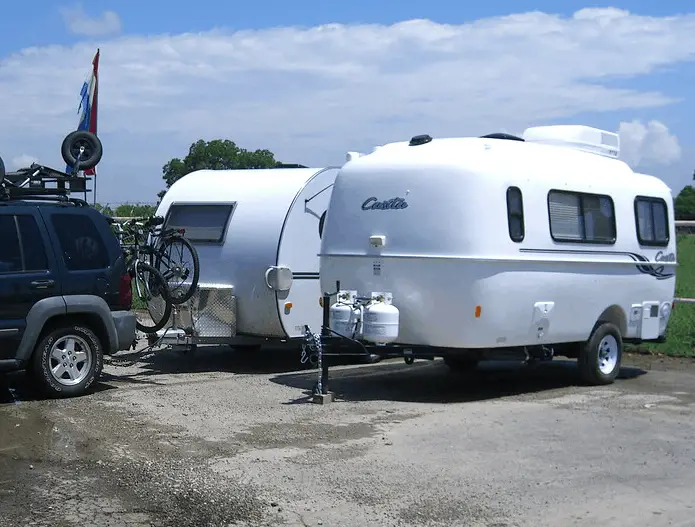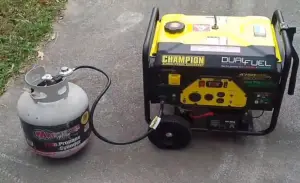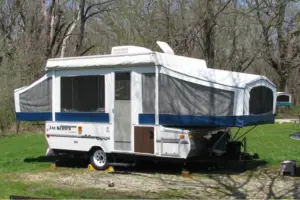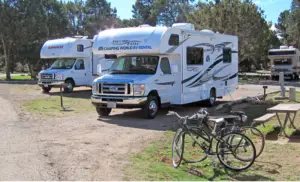What’s better aluminum or fiberglass RV? This is exactly what you will learn in this article.
RVs are designed with siding on the exteriors of the vehicle for protection from environmental elements and insulation to keep the interior at livable temperatures.
The most commonly used siding materials are aluminum and fiberglass. These two materials have their benefits and shortcomings.
Don’t know what material your RV is made up of? Check this guide that tells you exactly that.
Are fiberglass travel trailers better than aluminum?
Fiberglass travel trailers are a great investment as they hold their value much better, have sleek design and are great in insulation. Their construction is also better and less prone to dents. However, they are costly and heavier than aluminum trailers.
In this article, I will provide you with all the pros and cons to help you decide between fiberglass vs. aluminum RV. Going through this will give you idea on which is a better construction for a travel trailer.
Pros and Cons of Fiberglass RV
Fiberglass, though it’s less common than aluminum, is constructed using plastic and glass fiber. Some of the interesting properties include a high strength-to-weight ratio and conductivity. Compared to aluminum, fiberglass is new to the RV world.
Pros
1. Better Insulation
Fiberglass RVs are more insulated than aluminum against harsh temperatures. Aluminum campers can get really hot, especially when sitting in direct sunlight for a while.
On the other hand, when it’s cold, fiberglass RV will be able to withstand harsh and extreme temperatures. Therefore, when choosing a travel trailer, make sure you get maximum insulation.
2. Resistant to Noise
Due to their excellent insulation, fiberglass campers are quieter and resistant to noise than aluminum RVs. If you are camping in your RV near a busy road or you are in a noisy campground, you will have a peaceful and comfortable night’s sleep when inside the RV.
3. Sleek Finish
Fiberglass wins hands-down when it comes to shining and a beautiful sleek finish. Additionally, fiberglass RVs are available in different color options than aluminum. Aluminum campers don’t come with many choices to choose from. Therefore, if you want an RV that you can easily customize, then you should consider fiberglass.
4. Easy Maintenance
Many people who own fiberglass RVs have found that that they are easy to clean and maintain. They are easy to clean, and they don’t attract and hold on to dust and debris. A fiberglass RV is always clean and well maintained.
5. High Resale Value
When selling your RV, you will fetch more money if it has a fiberglass siding than aluminum. If you plan to sell your RV in the future, you should invest in fiberglass RV.
The thing that makes fiberglass trailers good at resale value is their classic design and looks that haven’t changed in years. For example, scamp or casita trailers, if you look at their design it looks similar for many many years. This ultimately leads to less depreciation.
6. Less Prone to Dents
Fiberglass is a better material at resisting dents than aluminum. This makes it more durable and easy to maintain than aluminum.
7. Aesthetics
If you want a modern, stylish trailer, you should go for fiberglass trailers. Most people are naturally drawn to fiberglass trailers due to their looks.
8. Aerodynamics
Fiberglass RVs have a smooth-sided construction, whereas most of aluminum RVs have bumpy construction. The smooth quality construction of fiberglass RVs allows it to slip through the air making it more aerodynamic.
Cons
1. More Expensive
Fiberglass RVs are more expensive options than aluminum campers. The materials used to construct fiberglass RVs are costly to produce hence their high prices. However, they are more durable than aluminum campers. But if you have a high budget, you should consider fiberglass RV.
2. Very Heavy
Some types of fiberglass RV can be quite heavy. This depends on the type of frame underneath. This may make it difficult to drive around for long distances. If you want something light and easy to drive, you should go for aluminum campers.
Fiberglass roofs are strong and one can walk on those without much worry. However, they can be slippery and hence need to be careful.
3. UV Rays Damage
Fiberglass campers are easily damaged by UV rays than aluminum campers. If your fiberglass camper is left in direct sunlight for long, the fiberglass will wear down, and the paint will fade. Aluminum material is known to hold up UV rays better.
How to remove oxidation from fiberglass trailer
Gel coat on the fiberglass can loose its luster with time. This can be fixed using multiple methods like below,
- Polish the fiberglass RV using fiberglass restorer and wax through simple soft non scracthign sponge.
- Restore the RV coat gel through electric power buffer
Can use other products to rejuvenate the fiberglass trailer and remove the RV gel coat oxidation.
Pros and Cons of Aluminum RV
Aluminum RVs have a layer of aluminum material on the outside with a wood frame. Aluminum camper siding can be either corrugated or smooth. They may not have the look of their fiberglass cousins, but they come with different benefits and cons.
Pros
1. They are Cheap
Aluminum RVs are a more budget-friendly option than fiberglass. These are ideal for people who don’t want to spend a lot. Constricting a trailer from aluminum materials reduces the manufacturing costs by thousands of dollars. This is a great option for a first time RV buyer.
2. Highly Durable
Aluminum campers have been there for a long time and proven to be durable over the years. If you want to invest in a camper for long term use, you should go for aluminum RVs. With aluminum RV, you will not have to worry about repairs and maintenance, which can be costly.
3. Easy to Repair
If your aluminum RV gets damaged, it will be very easy to repair dents or broken aluminum panels than fiberglass RV. This is because; the aluminum panels can be replaced easily.
Additionally, it will be cheaper and faster to repair aluminum camper damages. It becomes easier if the aluminum is corrugated instead of smooth. Therefore, with aluminum trailers, you do not worry whenever your RV gets damaged or dents.
4. Tried and True
Aluminum RVs were among the first trailers. This means that manufacturers have perfected the craft over the years. On the other hand, fiberglass is relatively new in the RV market.
Once you purchase aluminum RV, you will have peace of mind investing in your new trailer.
5. Wood Framing
The wood framing in aluminum trailers provides insulation. It ensures that heat or cold does not move through the wall keeping the interior of the RV at the right temperatures.
This is because aluminum framing does not provide insulation from heat and cold, hence the wood framing technology. This enables RV owners to go camping in varying weather conditions.
6. Very Light
Aluminum siding is very light than fiberglass. This allows one to pull trailers with lighter tow capacities. Moreover, with aluminum, you will be able to drive for long distances due to the light weight features.
Also, being lightweight, aluminum provides a better option to buy a bigger RV instead of one with fiberglass siding.
Cons
1. Hard to Clean
Aluminum campers are not smooth and have ridges that make it tough to clean compared to sleek fiberglass. Therefore, it is difficult to keep your aluminum RV clean all the time. If you want a sleek RV, you should buy a fiberglass RV.
2. Low Resale Value
Aluminum RVs are not in high demand as compared to fiberglass RVs. If you plan to sell it in the future, you will get less money. Aluminum campers are ideal for people who want it for long term use and have no plans of selling it in the future.
3. They Are Not Aerodynamic
Aluminum RVs have ridges that make them wind-resistant as you drive; hence they are not aerodynamic. This translates to more costs in buying gas than fiberglass campers.
4. Easily Damaged
Aluminum trailers can easily be damaged by water and hail. If you do not inspect the corners and the roof, leaks may develop. When water runs through the inside of the walls, it leads to rotting and causes significant damages and expensive repairs.
How Long Do Fiberglass Trailers Last
On average a fiberglass trailer can last for around 10 to 12 years. However, this is the average life expectancy; they can last longer if regular maintenance is done as per manufacturer manuals.
The 10 years is the time it takes for you to get your money’s worth. Your RV life mostly depends on how you take care of it and protect it from elements of weather.
In order to make your travel trailer an excellent investment, it will need proper care and maintenance.
Understanding the life expectancy of a travel trailer is essential because it involves a huge investment. But, fiberglass travel trailer will last for longer than aluminum RV.
Regular maintenance and repairs when needed will keep the fiberglass trailer in good shape. Best way to restore and maintain fiberglass RV is to do repaint whenever necessary.
Check out this guide on how to repair fiberglass on RV.
Here are quick steps to paint an exterior of fiberglass travel trailer.
- Cleaning the exterior
- Polish and Rub with sandpaper
- Cover the exitiors wher is not required with paintr tape
- Smoothen the extiors by applying primer
- Paint the exterior and once done wait for around 24 hours
- Do the waxing. This will provide shinning and protection
Do Fiberglass RVs Leak?
Fiberglass RVs do not leak easily unless there are holes and cracks in it.
In most cases, the fiberglass RV roof cracks and allows water to run through the cracks. Furthermore, with time, the roof of your fiberglass camper may develop holes leading to leaks.
In all case you need to inspect the roof, decals and look for any white coloring. Cleaning a fiberglass is much easier.
How to know if an RV is Aluminum or Fiberglass?
When buying a travel trailer, you should understand the differences between the two to make an informed decision. You can know if a travel trailer is an aluminum or fiberglass in different ways.
One of the easiest ways to tell the material is the texture. When you go to buy a camper, you will notice a huge difference in the exterior part.
A fiberglass RV is smooth and flat on the outside, but an aluminum RV will have ridges on the outside.
The fiberglass RV will be shiny and clean, while the aluminum one will not be smooth and shiny. Furthermore, the aluminum RV will be much cheaper than the one with fiberglass siding.
Best Fiberglass Travel Trailers
There are not many manufacturers that still make fiberglass roofs. Here are some of those that make them.
Now that we have seen the advantages and disadvantages of both options its time to give you some great options in fiberglass trailer.
Escape 5.0
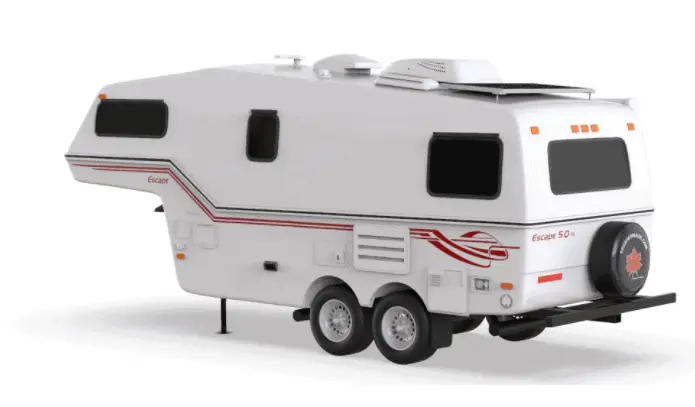
This trailer is ideal for family camping and road trips. It is lightweight, has plenty of storage space and 15-inch wheels.
- Sleep upto 5 people
- Priced starting at around $29,995
- One piece shell construction
- Aerodynamic design
- Dry weight of 3950 lbs
- Packed with all basic amenities and features
- Fresh water capacity of 28 gallons
Oliver Legacy Elite 2
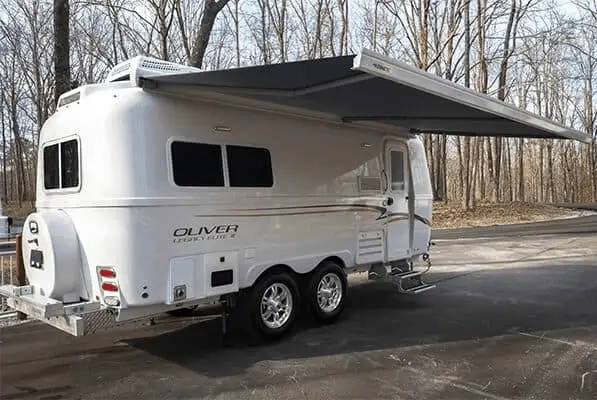
This fiberglass RV has 18 feet of living space, which includes a large bathroom. The interior finishes are customizable.
This is a molded fiberglass trailer that costs a little higher at around $55,000. Its unique and solid construction with insulation makes it 4 season trailer.
- Luxurious and very comforting
- Twin bed floor plans
- Solar power package for boondocking
- Power awning with a length of 16′
- Molded fiberglass interiors
- Little heavier at dry weight of 4900 lbs
Scamp Trailer

If you want a trailer with a large refrigerator and lots of sleeping and storage space, you should buy this RV. Brand new scamp trailer costs around $21,000.
They have multiple models and layouts. Scamp trailers are compact and are affordable. Several people have experienced them and most people are really satisfied with what they offer.
They have 13 feet, 16 feet and 19 feet trailers. Each of these have almost similar design and layout. 19 feet length RV is in fact a fifth wheel.
Casita
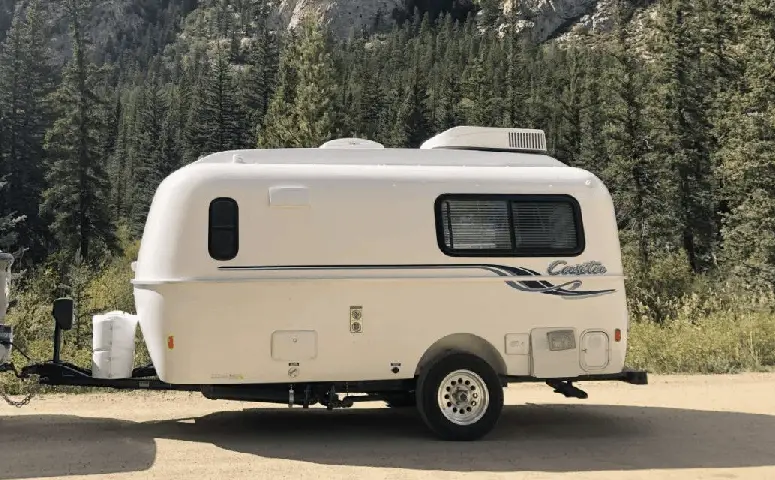
This is like an improved version of scamp trailer. They have better interior and features. Costing around $20,000 to $25,000 this fiberglass trailer is perfect for long term use.
They weigh around 2200 to 2400 lbs and sleep 2-4 people.
Casita trailer one f the light weight RVs that are easy to hookup. They are in manufacturing since 1981 and have enjoyed a big user base.
The aerodynamic design of these trailers works really well against the wind resistance and makes them easy for towing.
It is fitted with all the modern and basic features you would expect like air conditioning, sleeping, large windows, storage.
In Conclusion
Hopefully this fiberglass vs aluminum comparison has given you idea on what to expect from each of these. RVs are a great option for those people who love being on the road all the time. They make traveling more comfortable and fun. With the above information, it will be easy for you to decide whether you want a fiberglass or aluminum RV.

